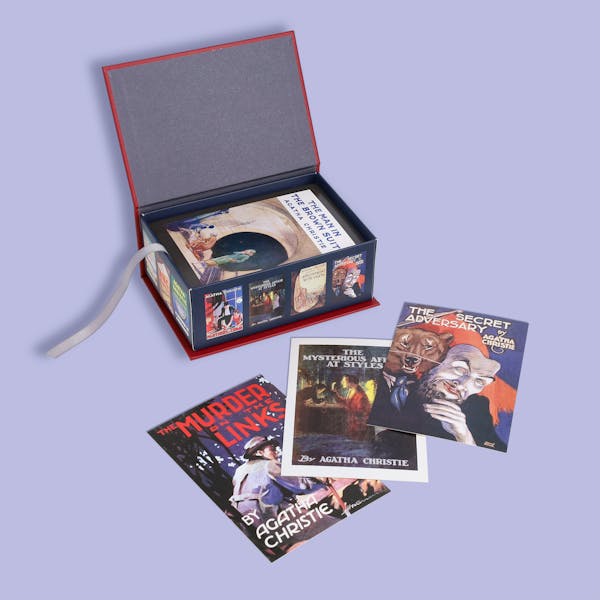Features
On Writing: Agatha Christie's Career

Agatha Christie’s autobiography is a treasure-trove of information about her childhood, her family and relationships, her travel adventures, and her career. But it is also a thrilling examination of her works, her writing methods, and her creative process. To celebrate Agatha Christie’s birthday month, we’ve pieced together her fascinating insights into writing. We hope they inspire you to pick up a pen and paper – even if it’s just for your weekly shopping list!
On the Craft of Writing
It's no good starting out by thinking one is a heaven-born genius - some people are, but very few. No, one is a tradesman - a tradesman in a good honest trade. You must learn the technical skills, and then, within that trade, you can apply your own creative ideas; but you must submit to the discipline of form.
On Writing As An Individual
If I could write like Elizabeth Bowen, Muriel Spark or Graham Greene, I should jump to high heaven with delight, but I know that I can't, and it would never occur to me to attempt to copy them. I have learnt that I am me, that I can do the things that, as one might put it, me can do, but I cannot do the things that me would like to do.
On Brevity
There is no doubt that the effort involved in typing or writing does help me in keeping to the point. Economy of wording, I think, is particularly necessary in detective stories. You don't want to hear the same thing rehashed three or four times over.

On Where She Wrote
I never had a definite place which was my room or where I retired specially to write. This has caused much trouble for me in the ensuing years, since whenever I had to receive an interviewer their first wish would always be to take a photograph of me at my work. ‘Show me where you write your books.’ ‘Oh, anywhere.’ ‘But surely you have a place where you always work ?’ But I hadn't. All I needed was a steady table and a typewriter.
On Self-doubt
You start into it, inflamed by an idea, full of hope, full indeed of confidence (about the only times in my life when I have been full of confidence)… You then get into difficulties, don't see your way out, and finally manage to accomplish more or less what you first meant to accomplish, though losing confidence all the time. Having finished it, you know that it is absolutely rotten. A couple of months later you wonder whether it may not be all right after all.
On Note-taking
…it is a pleasure sometimes, when looking vaguely through a pile of old note-books, to find something scribbled down, as: Possible plot - do it yourself- Girl and not really sister - August - with a kind of sketch of a plot. What it's all about I can't remember now; but it often stimulates me, if not to write that identical plot, at least to write something else.
On Research
As a result of writing crime books one gets interested in the study of criminology. I am particularly interested in reading books by those who have been in contact with criminals, especially those who have tried to benefit them or to find ways of what one would have called in the old days 'reforming' them - for which I imagine one uses far more grand terms nowadays!
On Writing During Difficult Times
Looking back at my war output, I really produced an incredible amount of stuff over those years. This was in anticipation of being killed in the raids, which was likely.
On Writing Detective Fiction
One of the pleasures of writing detective stories is that there are so many types to choose from: the light-hearted thriller, which is particularly pleasant to do; the intricate detective story with an involved plot which is technically interesting and requires a great deal of work, but is always rewarding; and then what I can only describe as the detective story that has a kind of passion behind it - that passion being to help save innocence. Because it is innocence that matters, not guilt.
On Writing for the Stage
Plays are much easier to write than books, because you can see them in your mind's eye, you are not hampered with all that description which clogs you so terribly in a book and stops you getting on with what's happening. The circumscribed limits of the stage simplifies things for you. You don't have to follow the heroine up and down the stairs, or out to the tennis lawn and back, thinking thoughts that have to be described.

On Writing Professionally
'I couldn't bear to sell Ashfield, I love it. It's - it's - it means everything.' 'Then why don't you try and do something about it ?' said Archie. 'What do you mean, do something about it ?' 'Well, you could write another book.' I looked at him in some surprise. 'I suppose I might write another book one of these days, but it wouldn't do much good to Ashfield, would it ?' 'It might make a lot of money,' said Archie.
Explore Agatha Christie Stationery Products

Agatha Christie Writer's Journal
Hone your writing craft with inspiration from Agatha Christie, the Queen of Crime, in this handsome lined journal from Chronicle Books.

Agatha Christie Pen Set
Put pen to paper with iconic quotes from the Queen of Crime and her most beloved characters. This set features 3 ballpoint pens.

Agatha Christie Classic Book Covers: 100 Postcards
Evoke the thrill of Agatha Christie's classic mysteries with these 100 postcards featuring iconic covers from some of the Queen of Crime's best-loved books.


 USA
USA 